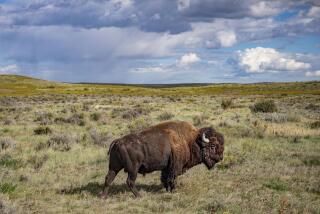STAGE REVIEW : Reliving the Wild West With ‘Wes and Jane’
- Share via
There’s nothing like a little history to put the present into perspective. Today’s inner cities may seem like an awful replay of the Wild West, but after hearing Calamity Jane and John Wesley Hardin tell their life stories at the Itchey Foot Cabaret, you realize nothing in America was wilder, more purely violent or more completely outside civilized behavior than the Wild West.
Few periods, too, were more beautiful, poetic and nakedly human. That comes through at the Itchey Foot as well. In their own self-revealing ways, Calamity Jane and Wes Hardin are very much tale tellers in the era of Mark Twain and Ambrose Bierce.
Let’s not get carried away, though. These are actors playing the blazing pair and reading Stephen J. Rivele’s script, “The Wes and Jane Show.” Suzan Hendershot’s and Mitch Carter’s readings are of the best kind, though, tending to dissolve your awareness of the actor and keeping few obstacles between us and the historical figure (Hendershot’s obvious aging makeup aside).
That these particular figures became embedded in myth during their own brief lives makes the theater transfer almost invisible. Calamity Jane played herself in “The Wild West Show” with Buffalo Bill, and ended up telling her story for paying customers.
That’s how writer-director Rivele presents her, just as he presents Wes speaking at--of all places--the El Paso Masonic Lodge. There’s none of the usual business associated with the one-person (especially the famous one-person) show--the mannered shifts between the comic and the moving, the sense that this person is wiser than us and thus deserving of the celebrity the show celebrates.
Especially with Carter’s Wes, the only comparable one-person performance is Philip Baker Hall’s Nixon in “Secret Honor.” With both portrayals, no amount of blood on the hands compares with the inner bulwark of self-justification that comes from an amoral center.
It’s just awfully hard to explain this to regular folk. For all their pride at being men of action, Wes and Nixon both insist that matters are somewhat out of their hands. People think you grab the gun, Wes comments, but the gun really grabs you.
An hour or more of this nonstop might be too much, so Rivele switches off between Wes and Jane. It isn’t arbitrary audience relief, however. Wes’ homicidal streak is mirrored by a minute one in Jane, who shoots Wild Bill’s murderer and then buries her only love. She sees that she’s capable of what Wes has mastered, which makes Wes more human. The difference is that she shakes it off.
In fact, for all her epochal shenanigans, Jane can be almost saintly, as when she nurses the sick during the near-apocalyptic 1879 smallpox epidemic. Again, today’s ills are put in a context. Hendershot plays as much as possible against the cliches of hell-bent-for Calamity with a feminine heart.
But what holds the ear and makes this show superior to many of the Mark Taper Forum’s literary pieces in this same room is Rivele’s prose, which can be poetic. Calamity Jane’s romance with cowboys is lodged in the image of their being dressed “in an evening gown of dust.” Her life with Wild Bill was rich. On one hand, he had this “mustache draped below his lips like silk curtains on a bishop’s window,” but he was also “as complex as a fistfight in a church.”
For Wes, “trouble seemed to like me,” he says. He describes his murders as if another man did them. And he’s a puzzled observer. No memories stay with him like those of holding his baby while he grasps two pistols or of a family vacation in Florida. This is writing that makes history our story.
At 801 W. Temple St., on Wednesdays and Thursdays, 8:30 p.m., indefinitely. Tickets: $8; (213) 481-3943 or (213) 680-0007.
More to Read
The biggest entertainment stories
Get our big stories about Hollywood, film, television, music, arts, culture and more right in your inbox as soon as they publish.
You may occasionally receive promotional content from the Los Angeles Times.










